Lying in a hospital bed while awaiting heart surgery, I looked at my teen daughter and my parents, then smugly pointed out the irregular slashes on the cardiac monitor.
“See these?” I said. “They’re called PVCs. My doctor is going to fix them. Make them all go away.”
The asymmetrical rhythm, a frequent and annoying pattern of multiple skipped heartbeats, had plagued me for the last three years, despite my swearing off caffeine and alcohol and trying different cardiac and thyroid medicines under my doctor’s supervision.
The irregular heartbeat stemmed from an enlarged right atrium, which had developed in spite of my healthy habits (regular exercise, no fried food, vegetables galore). My symptoms, I’d read, indicated a decline in heart function. (Yes, I had been Googling. That’s what you do when you’re a nurse whose specialty is not cardiac and your heart is aging, for no obvious reason, faster than you are.)
Now here I was, awaiting a procedure that was supposed to make things better. The cardiologists planned to cauterize the areas of abnormal electrical activity that were the culprits behind my irregular heartbeats.
In my five years’ experience as a perioperative nurse and twenty-plus as a healthcare professional, this was my first time on the other side of the operating table. Part of me expected someone to come by and tell me, “Game’s over. Get up and go back to work.”
“Mom, you’re talking kind of funny.”
I looked at my daughter. Years of dance had sculpted her nineteen-year-old body. Her arms, long and sinewy, wrapped around her tiny waist. Her collarbone jutted out just out enough to make her teardrop necklace dip down in the center.
“Hmm, they must have given me a sedative.”
She kissed my cheek, my parents gave me a thumbs-up, and the next thing I knew I was off to have catheters and an electric probe threaded up into my heart.
I took in the surreal experience of lying on a stretcher rather than standing beside it in my usual role as the pre-op nurse, providing reassurance and medications. The contrast made me giggle. My smile must have reassured the technician who approached. Even under the muted lights, I noticed his chiseled features.
“Okay, gorgeous, we need you to move over onto the table. You awake enough to help?”
“Why, of course!” I declared giddily.
After moving over, I noticed the impressive number of people in the room–at least five. Then one of them came over and placed two defibrillator pads on my chest.
And everything changed.
It wasn’t the cold gel that woke me from my sedative-induced intoxication; it was the sudden rush of thoughts.
The pads had been put in place, I knew, in case my heart went into a lethal arrhythmia or stopped. In case I stopped being.
I need to stop being mad at my little sister, I thought. I need to hug my parents more. I need to get the chip off my shoulder and be happy for my ex. He found another person he loved more. It’s okay; it leaves me open to be with someone who loves me more. My parents, my siblings–the five of us need to get together more often. Whatever happened, I’m not sure, but I don’t care anymore. I also want to see my daughter’s future wedding. I want to be a grandmother someday.
The knot in my throat became unbearable, and I let out a gasp, then a sob. My eyes filled with tears. The anesthetist walked over.
“I’m struggling with the reality of why these pads are on my chest,” I told her.
She nodded solemnly, then placed a reassuring hand on my arm. I no longer felt alone with my thoughts.
“This will help,” she said. Glancing down, I saw a filled syringe between her thumb and index finger.
It’s the last thing I remember until waking up in my hospital room again. Two nurses flanked me, pressing firmly on gauze pads over my left and right groin areas.
“The arterial catheters they used during the surgery were large,” one told me. “To completely stop the bleeding, we need to hold pressure for at least ten minutes.”
I spent those minutes remembering exactly what had gone through my mind when the defibrillator pads touched my chest.
Two days later, I went home with a 75 percent reduction in my PVCs. During my first week back at work, my boss let me leave early every day. Within a month, I returned to working out at my gym.
And ever since, I’ve been following through on the promises I made to myself. Through social media, texting and phone calls, I’ve kept up with my sisters, who live out of state. I hug my parents hard, and don’t let go first. All of us (plus spouses and nieces) got together and celebrated my dad’s eightieth birthday. I even accepted a Christmas-dinner invitation from my ex and his wife.
It’s going to sound corny, but I finally feel whole.
Just as important, each time I greet a patient, I remember all over again what fear tastes like. See, I’ve been a nurse so long that the hands-on skills (IVs, dressings, catheters) are second nature. Only since my ablation, though, do I fully understand how scary a hospital stay is.
Inwardly, I feel as confident as ever in my nursing abilities; but outwardly, I may come across as subdued, even a bit meek. I feel so much more aware of patients’ vulnerability, and I don’t want them holding back their feelings. I want everyone I care for to feel that they can let down their guard and tell me exactly what’s on their mind. So I soften my tone, maintain eye contact longer, ask first, “How long have you been dealing with this pain?” instead of offering a glib “Good morning” and “You’ll be fine.” I sit at their bedside and ask about grandkids or recent holidays. Happy moments. That’s what I want to get on their minds.
Lying on a table with an adhered wired pad ready and waiting to restart your heart–well, it’s humbling. I used to be driven by constant goal-setting, looking to the future and to where I wanted to be in five years. I no longer take for granted that I’m going to be here in five years.
I remind myself daily to live in the present–and do my best to connect with the people around me.

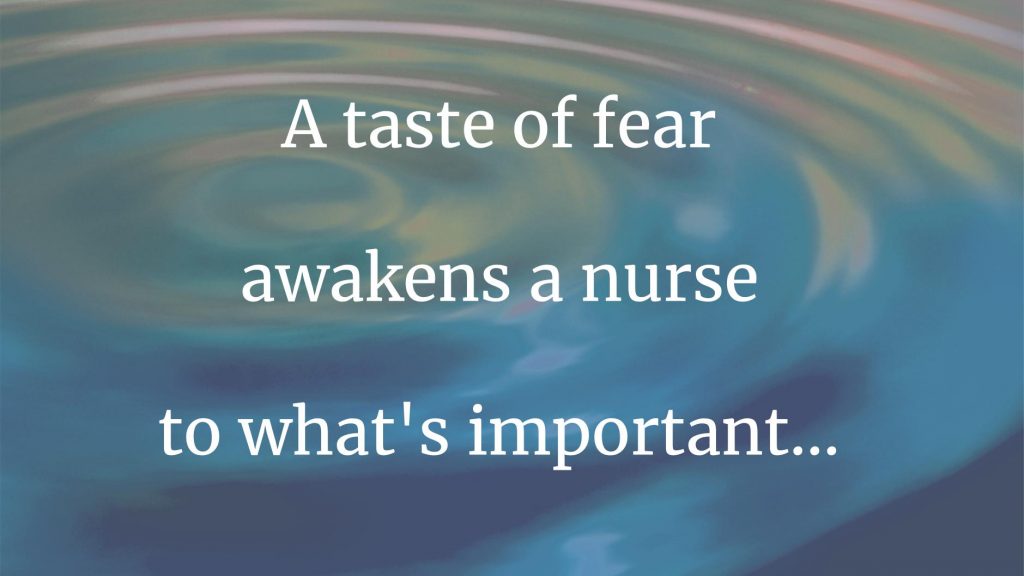
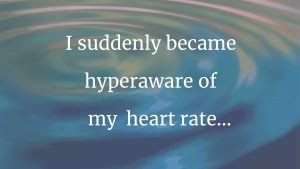
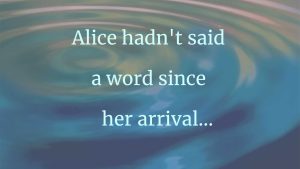
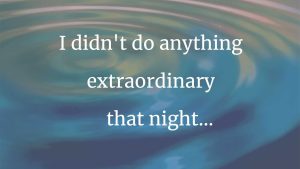
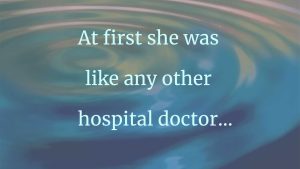
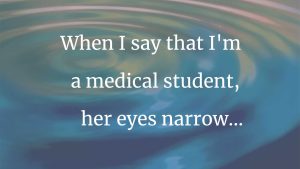
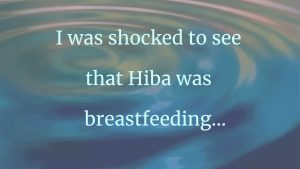
13 thoughts on “Shock of Recognition”
One more health professional who now better understands what it’s like to be a patient and vulnerable. Now, we only have a few million to go before we become truly patient-centered.
Susan, thanks for putting into words what a lot of patients must think when faced with an ablation. I’m a retired cardiac nurse and may find myself on the table some day. Great story.
Wonderful post. I just had brain surgery. Your experiences mimic the life changing, life enhancing, life distilling moments I am experiencing. Every day is suffused with reverence.
Cordon
Reality beautifully shared❤️ I am a registered nurse also and have shared your humbling experience. Live in the present, yes, it is a PRESENT. THANK YOU!
Thank you. Humbling and inspiring.
Thank you so much!
Thanks, this really touched my heart, no pun intended. So much emotion in this brief piece.
Such an honest, life-changing powerful story. In her statement at the end she says ‘all patients are scared’. So true. So wonderful to know there are more and more in the health professions who know that.
Wow! I definitely learned how to be a better nurse the hard way.
Ms. Bartlett, what an honest and heartfelt piece you have written about your experience as a patient. Your post-procedure response to life and work was a privilege to read, and frankly very inspiring. Your patients, and those in your circle of family and friends, are truly fortunate to have you in their midst.What you describe as a sense of feeling subdued seems to be rather the strength of someone comfortable with being open and vulnerable, qualities which are the hallmark of someone truly present to others. Thanks again for sharing your story.
I’m so appreciative of your comment. It took a while to be able to journal the experience!
Beautiful job, Susan. Been there myself. Very humbling indeed. Thanks for writing this as we nurses need to
Share our stories more.
Thank you! The moment the defibrillator pad hit my chest, my whole world changed!